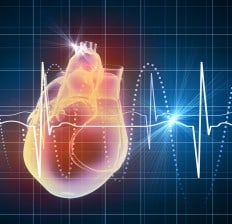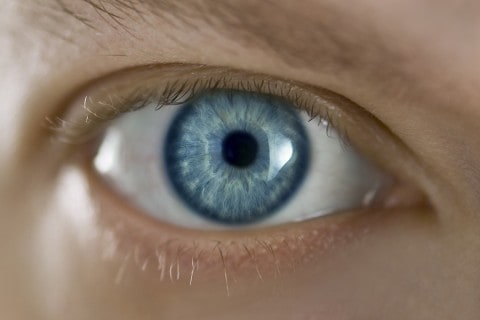Vitamin B1 Health Benefits, Deficiency, Food Sources - Vitamin B1, which is also referred to as thiamine, is a coenzyme used by the body to metabolize food for energy and to maintain proper heart and nerve function. Thiamine is used to digest and extract energy from the foods you eat by turning nutrients into useable energy in the form of “ATP”.
Without high enough levels of thiamine, the molecules found in carbohydrates and proteins (in the form of branched-chain amino acids) cannot be properly used by the body to carry out various important functions.
Thiamine is used in combination with other B vitamins, which make up the “B Vitamin Complex”, to regulate important functions of the cardiovascular system, endocrine system, and digestive system. Thiamine is a water-soluble vitamin and is used in nearly every cell in the body. It is especially important for supporting energy levels and a healthy metabolism.
A thiamine deficiency can cause weakness, chronic fatigue, heart complications, psychosis, and nerve damage. Thiamine can be found in many commonly eaten foods including yeasts, certain whole grains, beans, nuts, and meat. Additionally it is included in many vitamin B complex supplement products.
Vitamin B1/Thiamine Deficiency Symptoms
The clinical signs of a thiamine deficiency include:
A thiamine deficiency can cause a disorder called beriberi, which has been seen in populations for thousands of years. This is when muscle wasting is experienced and severe cardiovascular problems like an enlarged heart can be experienced. However more recently in developed nations like the Unites States, we commonly see a Thiamin ddeficiencyy in alcoholics, which is known as Wernicke-Korsakoff syndrome. Most alcoholics that are diagnosed with this disorder also report not eating much food in addition to drinking a lot of alcohol, which is a big contributing factor to the deficiency.
Best Sources of Vitamin B1 (Thiamine)
The richest food sources of thiamine include various beans, nuts, seeds, seaweed (or spirulina powder), and yeast, especially “nutritional yeast” which is a seasoning commonly used by vegetarians that naturally tastes similarly to cheese. Some types of meat organs, including liver, also contain smaller amounts, as do certain whole grains like oats and barley.
Thiamine is usually found in most whole-grain and enriched grain products like breads, pastas, rice, and fortified cereal grains. These foods are enriched with thiamine, meaning thiamine is added into the food synthetically.
While some of these foods do naturally contain thiamine in their whole, unprocessed form, a lot of the vitamin is lost during the refining process and therefore must be added back in after. In products where thiamine is added to the food synthetically, you will usually see the words “enriched” or “fortified”. Unlike processed products, whole foods like nuts, beans, and seeds naturally contain a high amount of thiamine
Most fruits and vegetables do not provide very high amounts of thiamine although some like peas and tomatoes do contain low or moderate amounts. Other kinds like asparagus, potatoes, mushrooms, romaine lettuce, spinach, brussel sprouts and eggplant include small amounts of B vitamins like thiamine, so when you consume high amounts of these you are getting a good dose.
15 Vitamin B1/ Thiamine Food Sources:
Based on the adult RDA of 1.2 mg/daily
Vitamin B1/Thiamine Benefits
1. Maintains a Healthy Metabolism

Thiamine is needed to make adenosine triphosphate (ATP), the body’s main energy-carrying molecule, within the mitochondria of cells. Thiamine helps in the conversion of carbohydrates into glucose, which is the preferred source of energy that the body runs off of to keep your metabolism running smoothly. Thiamine also helps break down proteins and fats too. We know that the coenzymatic form of thiamine is involved in two main types of metabolic reactions within the body: decarboxylation and transketolation. After eating something containing thiamine, it is transported in the blood and plasma and then used by the cells to convert energy.
Thiamine also plays an important role in the production of red blood cells, which are used for ongoing energy. Because thiamine and other B vitamins are naturally energy boosting and required to produce ATD from foods, you will often find B Vitamin Complex supplements labeled as “energy boosting” or “healthy metabolism” products. Ingesting thiamine is supplement form is also sometimes given to patients to help correct metabolic disorders associated with genetic diseases.
2. Prevents Nerve Damage
Thiamine is needed to convert carbohydrates from our food, and the main role of carbohydrates is to provide energy for the body, especially for the brain and nervous system. Thiamine is specifically needed for a system of enzyme reactions called pyruvate dehydrogenase, which works to oxidize sugars that we eat . Without enough “fuel” from food going towards the function of our nervous system, we can experience nerve damage that can result in trouble moving, learning, and remembering information.
Thiamine also helps with proper development of myelin sheaths, which wrap around nerves to protect them from damage and death.
3. Supports a Healthy Cardiovascular System

Having enough thiamine in the body is essential for producing the neurotransmitter called acetylcholine. This is used to relay messages between the nerves and the muscles, our heart being one of the main muscles that relies on these crucial signals.
In order to maintain proper cardiac function and healthy heart beat rhythms, the nerves and muscles must be able to use bodily energy to keep signaling to each other. Recent studies have shown that thiamine can be useful in fighting heart disease because it helps to maintain healthy ventricular function and to help treat heart failure.
4. Boosts Immunity
Thiamine helps to maintain the muscle tone along the walls of the digestive tract, where much of the immune system is actually located. Digestive health is important for thiamine absorption because a healthy digestive tract allows your body to extract nutrients from food better, which are used to boost immunity and defend you from becoming sick. Thiamine helps in the secretion of hydrochloric acid, which is essential for the complete digestion of food particles and absorption of nutrients.
5. Treats Alcoholism
Thiamine helps to decrease the risk for developing the specific brain disorder called Wernicke-Korsakoff syndrome (WKS). WKS symptoms include involuntary muscle movement, nerve damage, lethargy, and trouble walking. This brain disorder is related to low levels of thiamine and is often seen in alcoholics, especially those who have a poor diet as well (7). Alcohol negatively impacts the body’s ability to absorb thiamine from foods.
It is believed that between 30%-80% of alcoholics have thiamine deficiency. High doses of thiamine can also help to decrease symptoms of alcohol withdrawal.
6. Prevents Brain Disorders

Thiamine helps to bridge the gap between the brain/body connection. It can help defend against a type of brain damage called cerebellar syndrome. Healthcare providers will also sometimes give high doses of thiamine to patients to prevent certain memory disorders that are commonly seen in thiamine deficient people, including those experiencing alcohol withdrawal or coming out of a coma.
7. Enhances Learning
Thiamine is a crucial vitamin for increasing focus, energy, fighting chronic stress, and possibly preventing memory loss. Studies have linked thiamine deficiency to problems learning and retaining information. One study showed that thiamine caused quick reaction times and feelings of clear-headedness in those taking tests.
8. Helps Keep a Positive Mood
Thiamine improves the body’s ability to withstand stress, which is one reason why B vitamins are often called the “anti-stress” vitamins. A lack of energy can contribute to a poor mood and motivation. Thiamine is needed to boost your mood and to defend against depression and anxiety because of its positive effects on the brain.
It can ward off inflammation and help to maintain healthy brain function that is responsible for decision making in the brain. Healthy nerve function is crucial for controlling stress and anxiety and boosting your mood.
9. Helps Prevent Vision Problems

Some research has shown that thiamine can help to defend against vision problems such as cataracts and glaucoma. This is due to its ability to influence nerve and muscle signaling, which is important in relaying information from the eyes to the brain.
Supplementing with Vitamin B1 (Thiamine)
As with all nutrients, it’s best to try to obtain them from actual whole food sources as opposed to supplements whenever possible. Thiamine deficiency does not seem to be common according to studies, so for the average person, supplementing with extra thiamine is not needed.
Vitamin B1 is normally included in Vitamin B complex supplements. Most complex supplements will include vitamin B1 (thiamine), vitamin B2 (riboflavin), vitamin B3 (niacin/niacinamide), vitamin B5 (pantothenic acid), vitamin B6, vitamin B12 and other vitamins that work together to produce energy through effective food absorption.
As of now, there have been very few confirmed cases of very serious adverse effects reported after taking too much dietary thiamine. There is not much concern over consuming too much thiamine at one time because it is a water-soluble vitamin and it’s believed that only a small percentage of a high dose of thiamine is actually absorbed by the body.
The access levels that the body does not need results in urinary excretion of the vitamin within a few hours . Extra vitamin B1 in supplement form will not cause damage in the body, but it also isn’t necessarily one of the most crucial nutrients to obtain in supplement form either.
If you are going to be taking a supplement that contains thiamine, look for a high-quality product that is made from real food sources. Below is the RDA for Vitamin B1 (Thiamine) supplementation according to the USDA:
Vitamin B1/Thiamine Interactions & Side Effects
It’s believed that thiamine may not properly be absorbed by some people who have liver problems, drink a lot of alcohol, or have other specific medical conditions. Additionally there are some foods that are known to disrupt thiamine absorption.
Certain substances in coffee and tea called tannins can react with thiamine by turning it into a form that is difficult for the body to absorb properly, potentially leading to digestive problems and a thiamine deficiency. This is rarely seen however in western populations that have been studied and is believed to only occur when someone drinks a very large amount of caffeine.
Most researchers believe that the interaction between coffee and tea and thiamine is likely nothing to worry about unless someone’s diet is very low in thiamine and also vitamin C. This is because vitamin C seems to prevent the interaction between thiamine and the tannins in coffee and tea.
Research also shows that raw freshwater fish and shellfish can contain chemicals that destroy thiamine. This has been seen in people who eat high amounts of raw seafood, however cooked fish and seafood do not cause the same problem.
Some research also shows that certain nuts called areca (betel) nuts can change thiamine chemically so it doesn’t work as well. At this time there isn’t much research to conclude how thiamine may interact with any other medicines, so before taking a supplement, talk with your health professional if you take any medications.
Without high enough levels of thiamine, the molecules found in carbohydrates and proteins (in the form of branched-chain amino acids) cannot be properly used by the body to carry out various important functions.
Thiamine is used in combination with other B vitamins, which make up the “B Vitamin Complex”, to regulate important functions of the cardiovascular system, endocrine system, and digestive system. Thiamine is a water-soluble vitamin and is used in nearly every cell in the body. It is especially important for supporting energy levels and a healthy metabolism.
A thiamine deficiency can cause weakness, chronic fatigue, heart complications, psychosis, and nerve damage. Thiamine can be found in many commonly eaten foods including yeasts, certain whole grains, beans, nuts, and meat. Additionally it is included in many vitamin B complex supplement products.
Vitamin B1/Thiamine Deficiency Symptoms
The clinical signs of a thiamine deficiency include:
- Anorexia or rapid weight loss
- Poor appetite
- Colitis
- Ongoing digestive problems such as diarrhea
- Nerve damage
- Nerve inflammation (neuritis)
- Fatigue
- Decrease in short-term memory
- Confusion
- Irritability
- Muscle weakness
- Mental changes such as apathy or depression
- Cardiovascular effects such as an enlarged heart
A thiamine deficiency can cause a disorder called beriberi, which has been seen in populations for thousands of years. This is when muscle wasting is experienced and severe cardiovascular problems like an enlarged heart can be experienced. However more recently in developed nations like the Unites States, we commonly see a Thiamin ddeficiencyy in alcoholics, which is known as Wernicke-Korsakoff syndrome. Most alcoholics that are diagnosed with this disorder also report not eating much food in addition to drinking a lot of alcohol, which is a big contributing factor to the deficiency.
Best Sources of Vitamin B1 (Thiamine)
The richest food sources of thiamine include various beans, nuts, seeds, seaweed (or spirulina powder), and yeast, especially “nutritional yeast” which is a seasoning commonly used by vegetarians that naturally tastes similarly to cheese. Some types of meat organs, including liver, also contain smaller amounts, as do certain whole grains like oats and barley.
Thiamine is usually found in most whole-grain and enriched grain products like breads, pastas, rice, and fortified cereal grains. These foods are enriched with thiamine, meaning thiamine is added into the food synthetically.
While some of these foods do naturally contain thiamine in their whole, unprocessed form, a lot of the vitamin is lost during the refining process and therefore must be added back in after. In products where thiamine is added to the food synthetically, you will usually see the words “enriched” or “fortified”. Unlike processed products, whole foods like nuts, beans, and seeds naturally contain a high amount of thiamine
Most fruits and vegetables do not provide very high amounts of thiamine although some like peas and tomatoes do contain low or moderate amounts. Other kinds like asparagus, potatoes, mushrooms, romaine lettuce, spinach, brussel sprouts and eggplant include small amounts of B vitamins like thiamine, so when you consume high amounts of these you are getting a good dose.
15 Vitamin B1/ Thiamine Food Sources:
Based on the adult RDA of 1.2 mg/daily
- Nutritional Yeast - 2 Tbsp: 9.6 mg (640%)
- Seaweed - 1 cup seaweed: 2.66 mg (216%)
- Sunflower Seeds - 1 cup: 2.0 mg (164%)
- Macadamia Nuts - 1 cup: 1.6 mg (132%)
- Black Beans - 1/3 cup dried, or about 1 cup cooked: .58 mg (48%)
- Lentils - 1/3 cup dried, or about 1 cup cooked: .53 mg (44%)
- Organic Edameme/Soybeans - 1/3 cup dried, or about 1 cup cooked: .53 mg (44%)
- Navy Beans - 1/3 cup dried, or about 1 cup cooked: .53 mg (44%)
- White Beans - 1/3 cup dried, or about 1 cup cooked: .53 mg (44%)
- Green Split Peas - 1/3 cup dried, or about 1 cup cooked: .48 mg (40%)
- Pinto beans - 1/3 cup dried, or about 1 cup cooked: .46 mg (39%)
- Mung Beans - 1/3 cup dried, or about 1 cup cooked: .42 mg (36%)
- Beef Liver - 1 3 oz. piece cooked: .32 mg (26%)
- Asparagus - 1 cup cooked: .30 mg (25%)
- Brussel Sprouts - 1 cup cooked: .16 (13%)
Vitamin B1/Thiamine Benefits
1. Maintains a Healthy Metabolism

Thiamine is needed to make adenosine triphosphate (ATP), the body’s main energy-carrying molecule, within the mitochondria of cells. Thiamine helps in the conversion of carbohydrates into glucose, which is the preferred source of energy that the body runs off of to keep your metabolism running smoothly. Thiamine also helps break down proteins and fats too. We know that the coenzymatic form of thiamine is involved in two main types of metabolic reactions within the body: decarboxylation and transketolation. After eating something containing thiamine, it is transported in the blood and plasma and then used by the cells to convert energy.
Thiamine also plays an important role in the production of red blood cells, which are used for ongoing energy. Because thiamine and other B vitamins are naturally energy boosting and required to produce ATD from foods, you will often find B Vitamin Complex supplements labeled as “energy boosting” or “healthy metabolism” products. Ingesting thiamine is supplement form is also sometimes given to patients to help correct metabolic disorders associated with genetic diseases.
2. Prevents Nerve Damage
Thiamine is needed to convert carbohydrates from our food, and the main role of carbohydrates is to provide energy for the body, especially for the brain and nervous system. Thiamine is specifically needed for a system of enzyme reactions called pyruvate dehydrogenase, which works to oxidize sugars that we eat . Without enough “fuel” from food going towards the function of our nervous system, we can experience nerve damage that can result in trouble moving, learning, and remembering information.
Thiamine also helps with proper development of myelin sheaths, which wrap around nerves to protect them from damage and death.
3. Supports a Healthy Cardiovascular System

Having enough thiamine in the body is essential for producing the neurotransmitter called acetylcholine. This is used to relay messages between the nerves and the muscles, our heart being one of the main muscles that relies on these crucial signals.
In order to maintain proper cardiac function and healthy heart beat rhythms, the nerves and muscles must be able to use bodily energy to keep signaling to each other. Recent studies have shown that thiamine can be useful in fighting heart disease because it helps to maintain healthy ventricular function and to help treat heart failure.
4. Boosts Immunity
Thiamine helps to maintain the muscle tone along the walls of the digestive tract, where much of the immune system is actually located. Digestive health is important for thiamine absorption because a healthy digestive tract allows your body to extract nutrients from food better, which are used to boost immunity and defend you from becoming sick. Thiamine helps in the secretion of hydrochloric acid, which is essential for the complete digestion of food particles and absorption of nutrients.
5. Treats Alcoholism
Thiamine helps to decrease the risk for developing the specific brain disorder called Wernicke-Korsakoff syndrome (WKS). WKS symptoms include involuntary muscle movement, nerve damage, lethargy, and trouble walking. This brain disorder is related to low levels of thiamine and is often seen in alcoholics, especially those who have a poor diet as well (7). Alcohol negatively impacts the body’s ability to absorb thiamine from foods.
It is believed that between 30%-80% of alcoholics have thiamine deficiency. High doses of thiamine can also help to decrease symptoms of alcohol withdrawal.
6. Prevents Brain Disorders

Thiamine helps to bridge the gap between the brain/body connection. It can help defend against a type of brain damage called cerebellar syndrome. Healthcare providers will also sometimes give high doses of thiamine to patients to prevent certain memory disorders that are commonly seen in thiamine deficient people, including those experiencing alcohol withdrawal or coming out of a coma.
7. Enhances Learning
Thiamine is a crucial vitamin for increasing focus, energy, fighting chronic stress, and possibly preventing memory loss. Studies have linked thiamine deficiency to problems learning and retaining information. One study showed that thiamine caused quick reaction times and feelings of clear-headedness in those taking tests.
8. Helps Keep a Positive Mood
Thiamine improves the body’s ability to withstand stress, which is one reason why B vitamins are often called the “anti-stress” vitamins. A lack of energy can contribute to a poor mood and motivation. Thiamine is needed to boost your mood and to defend against depression and anxiety because of its positive effects on the brain.
It can ward off inflammation and help to maintain healthy brain function that is responsible for decision making in the brain. Healthy nerve function is crucial for controlling stress and anxiety and boosting your mood.
9. Helps Prevent Vision Problems

Some research has shown that thiamine can help to defend against vision problems such as cataracts and glaucoma. This is due to its ability to influence nerve and muscle signaling, which is important in relaying information from the eyes to the brain.
Supplementing with Vitamin B1 (Thiamine)
As with all nutrients, it’s best to try to obtain them from actual whole food sources as opposed to supplements whenever possible. Thiamine deficiency does not seem to be common according to studies, so for the average person, supplementing with extra thiamine is not needed.
Vitamin B1 is normally included in Vitamin B complex supplements. Most complex supplements will include vitamin B1 (thiamine), vitamin B2 (riboflavin), vitamin B3 (niacin/niacinamide), vitamin B5 (pantothenic acid), vitamin B6, vitamin B12 and other vitamins that work together to produce energy through effective food absorption.
As of now, there have been very few confirmed cases of very serious adverse effects reported after taking too much dietary thiamine. There is not much concern over consuming too much thiamine at one time because it is a water-soluble vitamin and it’s believed that only a small percentage of a high dose of thiamine is actually absorbed by the body.
The access levels that the body does not need results in urinary excretion of the vitamin within a few hours . Extra vitamin B1 in supplement form will not cause damage in the body, but it also isn’t necessarily one of the most crucial nutrients to obtain in supplement form either.
If you are going to be taking a supplement that contains thiamine, look for a high-quality product that is made from real food sources. Below is the RDA for Vitamin B1 (Thiamine) supplementation according to the USDA:
- Infants: 0-6 months, 0.2 mg; infants 7-12 months, 0.3 mg
- Children: 1-3 years, 0.5 mg; children 4-8 years, 0.6 mg; children 9-13 years, 0.9 mg
- Adult Men: 1.2 mg
- Adult Women: 1.1 mg
- Pregnant and Breast Feeding Women: 1.4-1.5 mg
- The typical dose for severe thiamine deficiency can be up to 300 mg per day, although this is only prescribed by doctors and used in certain cases
- For reducing the risk of getting cataracts a daily dietary intake of approximately 10 mg of thiamine is recommended
Vitamin B1/Thiamine Interactions & Side Effects
It’s believed that thiamine may not properly be absorbed by some people who have liver problems, drink a lot of alcohol, or have other specific medical conditions. Additionally there are some foods that are known to disrupt thiamine absorption.
Certain substances in coffee and tea called tannins can react with thiamine by turning it into a form that is difficult for the body to absorb properly, potentially leading to digestive problems and a thiamine deficiency. This is rarely seen however in western populations that have been studied and is believed to only occur when someone drinks a very large amount of caffeine.
Most researchers believe that the interaction between coffee and tea and thiamine is likely nothing to worry about unless someone’s diet is very low in thiamine and also vitamin C. This is because vitamin C seems to prevent the interaction between thiamine and the tannins in coffee and tea.
Research also shows that raw freshwater fish and shellfish can contain chemicals that destroy thiamine. This has been seen in people who eat high amounts of raw seafood, however cooked fish and seafood do not cause the same problem.
Some research also shows that certain nuts called areca (betel) nuts can change thiamine chemically so it doesn’t work as well. At this time there isn’t much research to conclude how thiamine may interact with any other medicines, so before taking a supplement, talk with your health professional if you take any medications.


